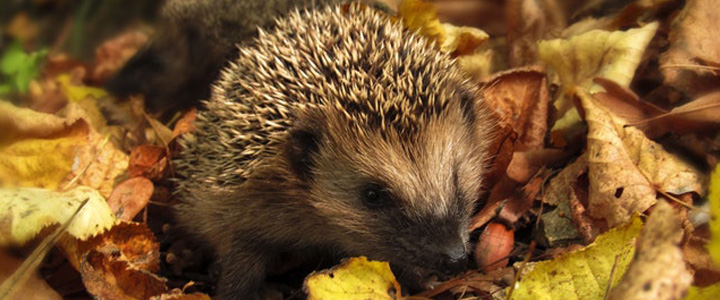
During winter, as the weather deteriorates and there is less food to be found in the countryside, there is plenty of things we can do to help wildlife not only survive but thrive. Feeding our feathered friends throughout the winter increases their breeding success the following season, and having cosy spots for hedgehogs will give them a beautiful place to hibernate until spring.
Things to do from late-autumn until mid-spring:
- Plant winter flowering plants
- Gather leaves, twigs and dead vegetation in areas of your garden and leave naturally untidy
- Fill your bird feeder with fat balls and cakes full of high calories
- Buy or build a bug home
- Buy or build a hedgehog home
- Provide a birdbox as a shelter for small birds
Plant winter flowering plants
Nectar and pollen are in short supply during winter. By planting winter-flowering wildflowers we can help extend the period of availability. Winter flowering plants such as cyclamens, hellebores,
winter aconites, pansies and
snowdrops can flower as early as December if conditions are mild.
Leaves, twigs and vegetation
Leaving areas of your garden with leaves, twigs and dead vegetation will provide wildlife with what they require to build their nests, and provide shelter for insects that hedgehogs and birds can feed on.
Your garden doesn’t have to look messy to achieve its aim of helping wildlife, and scattering brightly-coloured berries, apples and seeds will add colour and make it appealing to thrushes and blackbirds.
Feeding birds over winter
Fat balls and cakes which are high in calories and fat content are loved by birds, as helps to keep them warm. Make sure to keep your bird feeder topped up as birds will use vital energy to visit your garden for food.
If you buy fat balls, ensure to remove the plastic nets they come in as birds such as woodpeckers can get their tongues caught.
To make fat balls, add cheese, seeds and nuts to lard or suet and create the perfect food for birds over winter.
Bug homes
Bug homes are easy to make, and they provide insects with a much-needed shelter to survive the winter.
You can make your own bug homes or hotels by recycling old plastic bottles/tins and filling them with materials such as moss, twigs and pine cones.
Alternatively, if you can get your hands on wood logs, drill holes of different sizes into the logs and provide a cosy shelter for small garden creatures.
Hedgehog homes
We all love our little spiky friends, and during the harsh winter months, they appreciate having somewhere to hibernate. Find a quiet spot that is unlikely to be disturbed between November through to March, and make an excellent little shelter out of woodpiles.
If you are happy investing a little more time, make a box from untreated plywood boards and cover it with a polythene sheet to keep it dry. Then cover the box with soil and dry leaves making sure to leave a gap for entry to create a lovely hibernation spot.
Birdboxes
Putting up a nesting box will provide shelter to small birds that will usually return in the spring to nest.
Shield the entry from direct sunlight and wet winds by facing the box in a northeastern direction and make sure it is out of reach of roaming cats and squirrels.
For more information call our experts on 01205 281 902.



